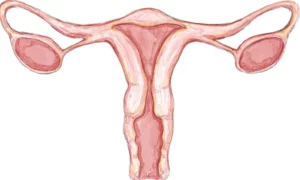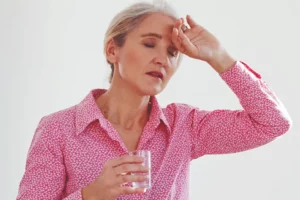Imagine navigating through your day when suddenly, a surge of heat hits you, leaving you drenched and uncomfortable. Sound familiar? If you’re a woman in the age range of 45 to 55, you might be experiencing the rollercoaster of menopause. But fear not – we’ve got your back!
So, buckle up as we aim to provide you with a thorough understanding of menopause, its symptoms, and effective management strategies. – from understanding the stages to tackling those notorious hot flashes, consider this your go-to manual for a seamless journey through it.
Contents
What is Menopause?
Menopause is a natural phase in a woman’s life, marking the end of her reproductive years. It is a natural and gradual occurrence typically experienced between the ages of 45 and 55 and signifies a crucial phase for women. At its essence, menopause denotes the cessation of menstrual cycles and a decline in reproductive hormones, namely estrogen and progesterone. It’s a nuanced process, not a sudden event, encompassing the changes that unfold just before or after your periods bid adieu, marking the conclusion of your reproductive years.
In a nutshell, menopause is that point in time when you’ve navigated through 12 consecutive months without a menstrual cycle in a completely natural way, embracing the biological shifts that accompany this significant life stage.
What Causes Menopause?
 Menopause is a natural part of getting older, typically happening around the age of 40. The main reason behind it lies in the ovaries, which play a crucial role in a woman’s reproductive system. These little powerhouses store eggs and make hormones, specifically estrogen and progesterone.
Menopause is a natural part of getting older, typically happening around the age of 40. The main reason behind it lies in the ovaries, which play a crucial role in a woman’s reproductive system. These little powerhouses store eggs and make hormones, specifically estrogen and progesterone.
As time goes on, the ovaries go through changes. They stop releasing eggs every month, and that’s when the menstrual cycle takes a break. So, in simpler terms, menopause happens because the ovaries decide to take a step back from their regular routine of releasing eggs and managing periods. Remember, it’s just a natural part of growing older after hitting around 40 years old. Understanding this process helps demystify why women go through menopause.
Common Symptoms of Menopause

Navigating through menopause is a unique journey for every woman, marked by a range of signs and symptoms. As the body undergoes changes, certain indicators emerge, serving as signals of this transformative phase. Here are the first signs and a glance at the common symptoms to watch out for:
Early Signs:
- Hot flashes
- Night sweats
- Irregular periods
- Vaginal dryness
Additional Symptoms:
- Mood changes
- Sore breasts
- Fatigue
- Difficulty sleeping
- Changes in libido
- Weight gain
- Hair thinning
- Memory lapses
- Joint and muscle aches
- Headaches
Menopause brings a variety of symptoms, and being aware of these indicators can help women navigate this phase with greater ease.
Stages of Menopause
 Embarking on the menopausal journey involves traversing through distinct stages, each accompanied by its own set of changes. Let’s delve into what happens during each phase:
Embarking on the menopausal journey involves traversing through distinct stages, each accompanied by its own set of changes. Let’s delve into what happens during each phase:
- Perimenopause:
- Irregular periods as hormone levels fluctuate.
- Hot flashes and night sweats may make their debut.
- Changes in mood and sleep patterns.
- Menopause:
- Cessation of menstrual cycles for a consecutive 12-month period.
- Intensification of symptoms like hot flashes and mood swings.
- A decline in reproductive hormones, especially estrogen and progesterone.
- Postmenopause:
- Stability in hormone levels, marking the end of menopausal symptoms.
- Adjustment to the new normal without menstrual cycles.
- Focus on maintaining overall health to mitigate long-term risks associated with postmenopause.
Understanding these stages equips women with the awareness needed to navigate through the transformative journey of menopause.
Health Implications After Menopause
It’s essential to recognize that menopause itself doesn’t cause specific health conditions, but the hormonal changes it brings may contribute to certain implications. Let’s explore the postmenopausal health landscape:
- Cardiovascular Health:
- Increased risk of heart disease postmenopause.
- Hormonal shifts may affect cholesterol levels and blood vessel health.
- Emphasizes the importance of heart-healthy lifestyle choices like regular exercise and a balanced diet.
- Bone Health:
- Decreased estrogen levels postmenopause can lead to bone density loss.
- Elevated risk of osteoporosis and fractures.
- Highlights the significance of calcium intake, weight-bearing exercises, and bone density assessments.
- Breast Cancer:
- Hormonal changes may play a role in breast cancer risk.
- Regular screenings and awareness crucial for early detection.
- Reinforces the importance of maintaining a healthy lifestyle and staying vigilant about breast health.
Navigating the postmenopausal phase involves a proactive approach to health, addressing these implications through informed choices and regular check-ups.

 Determining whether you’re entering or have reached menopause involves a straightforward diagnostic process. Here’s how menopause is diagnosed and the tests that may be required:
Determining whether you’re entering or have reached menopause involves a straightforward diagnostic process. Here’s how menopause is diagnosed and the tests that may be required: Menopause is a natural transition, not a health problem, but addressing its symptoms can enhance your quality of life. When discussing treatment options with your healthcare provider, it’s about managing the challenges that disrupt your daily routine. Alongside medical interventions, incorporating lifestyle tips can significantly contribute to a smoother menopausal journey:
Menopause is a natural transition, not a health problem, but addressing its symptoms can enhance your quality of life. When discussing treatment options with your healthcare provider, it’s about managing the challenges that disrupt your daily routine. Alongside medical interventions, incorporating lifestyle tips can significantly contribute to a smoother menopausal journey:
